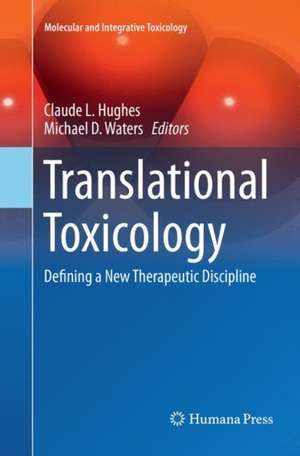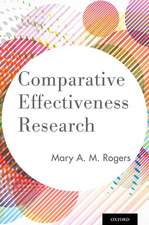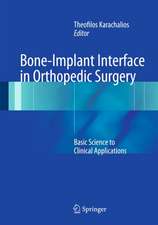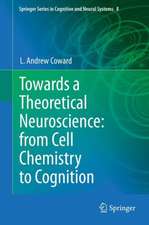Translational Toxicology: Defining a New Therapeutic Discipline: Molecular and Integrative Toxicology
Editat de Claude L. Hughes, Michael D. Watersen Limba Engleză Paperback – 25 apr 2018
TranslationalToxicology: Defining a New Therapeutic Discipline is an essential text for regulatory authorities, scientists, andphysicians who are concerned with environmental exposures, public health, nutrition,and pharmaceutical research and development. Basic science, epidemiological,and clinical investigators will also find this book a significant resource.
| Toate formatele și edițiile | Preț | Express |
|---|---|---|
| Paperback (1) | 989.50 lei 38-44 zile | |
| Springer International Publishing – 25 apr 2018 | 989.50 lei 38-44 zile | |
| Hardback (1) | 1113.83 lei 3-5 săpt. | |
| Springer International Publishing – 7 apr 2016 | 1113.83 lei 3-5 săpt. |
Din seria Molecular and Integrative Toxicology
- 5%
 Preț: 1113.83 lei
Preț: 1113.83 lei - 5%
 Preț: 1462.18 lei
Preț: 1462.18 lei - 5%
 Preț: 1099.20 lei
Preț: 1099.20 lei - 5%
 Preț: 1094.16 lei
Preț: 1094.16 lei - 5%
 Preț: 788.14 lei
Preț: 788.14 lei - 5%
 Preț: 1424.89 lei
Preț: 1424.89 lei - 5%
 Preț: 1102.67 lei
Preț: 1102.67 lei - 5%
 Preț: 727.97 lei
Preț: 727.97 lei - 5%
 Preț: 1301.22 lei
Preț: 1301.22 lei - 5%
 Preț: 1431.30 lei
Preț: 1431.30 lei - 5%
 Preț: 1106.86 lei
Preț: 1106.86 lei - 5%
 Preț: 1110.17 lei
Preț: 1110.17 lei - 5%
 Preț: 1292.67 lei
Preț: 1292.67 lei - 5%
 Preț: 1100.64 lei
Preț: 1100.64 lei - 5%
 Preț: 1301.24 lei
Preț: 1301.24 lei - 5%
 Preț: 736.20 lei
Preț: 736.20 lei - 5%
 Preț: 1090.97 lei
Preț: 1090.97 lei - 5%
 Preț: 1102.54 lei
Preț: 1102.54 lei - 5%
 Preț: 1024.03 lei
Preț: 1024.03 lei
Preț: 989.50 lei
Preț vechi: 1041.58 lei
-5% Nou
Puncte Express: 1484
Preț estimativ în valută:
189.34€ • 198.22$ • 156.67£
189.34€ • 198.22$ • 156.67£
Carte tipărită la comandă
Livrare economică 01-07 aprilie
Preluare comenzi: 021 569.72.76
Specificații
ISBN-13: 9783319801438
ISBN-10: 3319801430
Pagini: 380
Ilustrații: XV, 380 p. 32 illus., 12 illus. in color.
Dimensiuni: 155 x 235 mm
Ediția:Softcover reprint of the original 1st ed. 2016
Editura: Springer International Publishing
Colecția Humana
Seria Molecular and Integrative Toxicology
Locul publicării:Cham, Switzerland
ISBN-10: 3319801430
Pagini: 380
Ilustrații: XV, 380 p. 32 illus., 12 illus. in color.
Dimensiuni: 155 x 235 mm
Ediția:Softcover reprint of the original 1st ed. 2016
Editura: Springer International Publishing
Colecția Humana
Seria Molecular and Integrative Toxicology
Locul publicării:Cham, Switzerland
Cuprins
I.Introduction.- The Opportunity to Translate Developmental Toxicology into a Therapeutic Discipline.- TheRole of Toxicokinetics and Toxicodynamics in Developmental and TranslationalToxicology.- II.Toxicant Modes of Action and Biomarkers.- Mutational Effects.- Ligand-Mediated Toxicology: Characterization and Translational Prospects.- Effects of Environmentally Acquired Heavy Metals and Nutrients on the Epigenome and Phenotype.- Fetal Imaging and Effects of Exposures on Growth and Function.- III.Developmental Risks of Exposures and Potential Translational Toxicology Therapeutics.- Ovarian Toxicity of Environmental Contaminants: 50 Shades of Grey.- The“Toxic” Effects of a Perinatal Obesogenic Environment: Maternal Obesity andImpacts on Future Generations.- The Role of Environmental Exposures in Preterm Birth.- The Impact of Environmental Stressors on DNA Methylation, Neurobehavioral Development and Chronic Physical Aggression: Prospects for Early Protective Interventions.- Coffee Health Effects from Early Fetal Development through Childhood and Adolescence.
Notă biografică
Claude L. Hughes, M.D., Ph.D. is Executive Director in the Therapeutic Science & Strategy Unit within Quintiles Inc. He is board-certified in Obstetrics & Gynecology and Reproductive Endocrinology and Infertility. He is a Consulting Professor in the Department of Obstetrics & Gynecology, Duke University Medical Center and an Adjunct Professor in the Department of Mathematics, North Carolina State University and in the Department of Pathology/Comparative Medicine, Wake Forest University School of Medicine.
Since joining Quintiles in 2001, Dr. Hughes has served as a Medical Advisor on clinical trials or in due diligence assessment teams that evaluated pharmaceuticals, devices or tests for several medical indications. Therapeutic areas for clinical trials and/or product evaluation have included the following:
1) Reproductive Medicine - female sex hormone therapy, male sex hormone therapy, contraception, infertility, in vitro fertilization-embryo transfer, polycystic ovary syndrome, SERMs, overactive bladder/urinary incontinence, endometriosis, preterm labor, ovarian cancer, cervical cancer, microbicides, dysmenorrhea, gynecologic infections, female and male sexual dysfunction, erectile dysfunction, BPH/LUTS, delayed puberty in boys, primary and secondary hypogonadism in boys.
2) General Endocrinology, Metabolism and Cardiovascular Diseases – osteoporosis prevention and treatment, diabetes mellitus, thyroid hormone replacement, growth hormone therapy in children, hypertension (including use of ambulatory blood pressure monitoring - ABPM) and chronic renal disease.
3) Other Medical Conditions – GERD, opioid-induced constipation, rheumatoid arthritis, sleep disorders, migraine headaches, neuropathic pain and psoriasis.
4) Laboratory Testing Methods - genital cytologic screening and molecular biomarker screening.
5) Drug Delivery - new systems for transdermal, buccal or vaginal administration of drugs.
Prior to joining Quintiles, Dr. Hughes held academic, research, administrative and clinical practice positions for 15 years in divisions of reproductive endocrinology & infertility in departments of obstetrics & gynecology and clinical and research centers within university-affiliated medical centers. His academic research emphasized investigating the effects of natural and man-made sex hormone-like compounds in the diet in laboratory animal and human studies. Continuing collaborative academic research is supported by a National Science Foundation grant in the Department of Mathematics at North Carolina State University (Dr. Hughes is the co-Principal Investigator).
Since April 2008, Dr. Hughes has served as a member of the Metabolic Disorders Steering Committee (MDSC) of The Biomarkers Consortium, the public-private biomedical research partnership managed by the Foundation forthe National Institutes of Health (FNIH) that includes government, industry, patient advocacy groups, and other non-profit private sector organizations such as the National Institutes of Health, the Food and Drug Administration, and the Pharmaceutical Research and Manufacturers of America.
Michael D. Waters is a former government scientist with more than 35 years of experience in research and research management positions at US EPA and NIH/National Institute of Environmental Health Sciences in Research Triangle Park, NC USA. He retired as Chief Scientist, Emeritus, from Integrated Laboratory Systems (ILS), Inc. in 2013. He served as Assistant Director of the NIEHS National Center for Toxicogenomics from 2000 to 2007, and was responsible for a major initiative to develop the Chemical Effects in Biological Systems (CEBS) toxicogenomics knowledgebase. CEBS is now the data repository of the US National Toxicology Program and is being utilized by the NIH and other government agencies as well as the academic, industrial, and international regulatory scientific communities for the deposition, retrieval and interpretation of toxicology and toxicogenomics data. At NIEHS, he served on the NIH Bioinformatics and Computational Biology Roadmap Working Group, the US FDA Advisory Committee for Pharmaceutical Science, Pharmacology and Toxicology Subcommittee, the Toxicogenomics and Risk Assessment Committee of the International Programme on Chemical Safety (IPCS), the Advisory Board of the Microarray Gene Expression Data (MGED) Society and the Scientific Advisory Board of the Rat Genome Database (RGD). For 30 years he directed research in cellular pathology, biochemistry, and genetic toxicology in various capacities at the EPA in RTP, NC. He also served EPA as an Assistant Laboratory Director with programmatic responsibility for international, waste, and multi-media research programs. At EPA he conceived, designed, and helped to develop the EPA Gene-Tox database, now hosted by the National Library of Medicine. He also developed the EPA/International Agency for Research on Cancer (IARC) Genetic Activity Profile (GAP) Database which formed the basis for the use of short-term tests in the evaluation of presumptive human carcinogens by the IARC. His research interests have centered on the evaluation of chemically-induced mutations and altered molecular expression in the etiology of cancer and genetic disease. A widely-published scientist, he has edited Mutation Research-Reviews for nearly 20 years and has held adjunct professorships at both the University of North Carolina at Chapel Hill and at Duke University. He has served as President of the Environmental Mutagen Society and the International Association of Environmental Mutagen Societies. The databases he developed and a number of his publications are recognized as important advances that have significantly impacted the fields of genetic toxicology, carcinogenesis, toxicogenomics, and risk assessment.
Textul de pe ultima copertă
Bringing together a distinguished interdisciplinary team of contributors, this volume provides a comprehensive exploration of translational toxicology—a systematic approach to developing therapeutic interventions that can protect against, mitigate, or reverse the effects of exposures. In particular, the book addresses modes of action and biomarkers, developmental risks of exposures, and potential translational toxicology therapeutics. The result is a compelling application of developmental toxicology in a new therapeutic discipline that is destined to become part of standard medical practice.
Translational Toxicology: Defining a New Therapeutic Discipline is an essential text for regulatory authorities, scientists, and physicians who are concerned with environmental exposures, public health, nutrition, and pharmaceutical research and development. Basic science, epidemiological, and clinical investigators will also find this book a significant resource.
Translational Toxicology: Defining a New Therapeutic Discipline is an essential text for regulatory authorities, scientists, and physicians who are concerned with environmental exposures, public health, nutrition, and pharmaceutical research and development. Basic science, epidemiological, and clinical investigators will also find this book a significant resource.
Caracteristici
Defines a new field of therapeutic interventions that could protect, mitigate or reverse the adverse effects of earlier exposures Explores the range of environmental exposures beyond exclusively that of environmental chemicals and highlights the categories of potential therapeutics Future directions for research needs and opportunities













